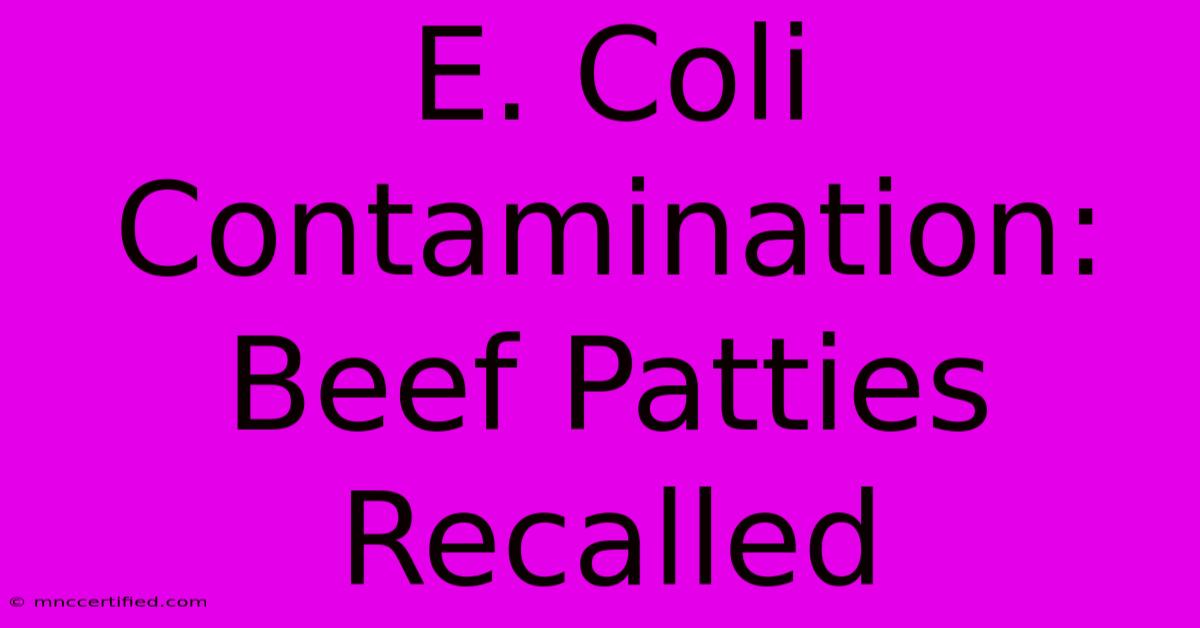E. Coli Contamination: Beef Patties Recalled

Table of Contents
E. Coli Contamination: Beef Patties Recalled – What You Need to Know
E. coli contamination is a serious food safety concern, and recent recalls of beef patties highlight the importance of understanding the risks and taking preventative measures. This article will delve into the details of recent E. coli outbreaks linked to beef patties, explain the dangers of E. coli contamination, and provide essential information on how to protect yourself and your family.
Understanding E. Coli Contamination in Beef
Escherichia coli, or E. coli, is a type of bacteria commonly found in the intestines of humans and animals. Most strains are harmless, but some, like Shiga toxin-producing E. coli (STEC), can cause serious illness. These harmful strains can contaminate beef during processing or through fecal contamination of the animal before slaughter. Ground beef is particularly vulnerable due to the increased surface area compared to a whole cut of meat.
Symptoms of E. Coli Infection
Symptoms of E. coli infection can range from mild to severe and typically appear within two to eight days after consuming contaminated food. These symptoms can include:
- Diarrhea (often bloody): This is a key indicator of E. coli infection.
- Stomach cramps
- Vomiting
- Fever
- Dehydration
In severe cases, E. coli infection can lead to hemolytic uremic syndrome (HUS), a life-threatening condition that damages the kidneys. Children, the elderly, and individuals with weakened immune systems are at a higher risk of developing HUS.
Recent Beef Patty Recalls and Their Impact
Recent recalls of beef patties due to E. coli contamination underscore the ongoing challenge of ensuring food safety. These recalls often involve large quantities of product and necessitate widespread action to prevent illness. It's crucial to check for recall notices from government agencies and food safety organizations. These notices usually include specific product details like brand name, best-by date, and lot numbers to identify affected products.
How Recalls Are Handled
When a recall is issued, retailers are responsible for removing the contaminated products from their shelves. Consumers who have purchased the recalled products are urged to not consume them and to either return them to the store for a refund or dispose of them safely. Government agencies often work closely with companies to trace the source of contamination and prevent future occurrences.
Preventing E. Coli Contamination at Home
While relying on safe food handling practices is key, individual consumers also have a vital role in preventing E. coli contamination. Here are some critical steps:
- Proper Cooking: Ensure beef patties are cooked to an internal temperature of 160°F (71°C) to kill harmful bacteria. Use a food thermometer to verify the temperature.
- Safe Handling: Wash your hands thoroughly with soap and water before and after handling raw beef. Avoid cross-contamination by using separate cutting boards and utensils for raw meat.
- Refrigeration: Store raw beef promptly at a temperature of 40°F (4°C) or below.
- Washing Produce: Thoroughly wash all fruits and vegetables before consumption to eliminate any potential surface contamination.
Staying Informed about Food Recalls
Staying informed about food recalls is paramount for protecting your health and the health of your family. Regularly check the websites of government agencies like the FDA (Food and Drug Administration) and the USDA (United States Department of Agriculture) for the latest recall information. You can also sign up for email alerts or follow these agencies on social media to receive immediate notifications.
Remember: Food safety is a shared responsibility. By understanding the risks of E. coli contamination, following safe food handling practices, and staying informed about recalls, we can work together to minimize the risk of illness.
Off-Page SEO Considerations:
- Link building: Secure backlinks from reputable food safety websites, health blogs, and news sources that cover food recalls.
- Social media promotion: Share the article on relevant social media platforms, using appropriate hashtags like #foodsafety #ecoli #beefrecall.
- Community engagement: Participate in online forums and discussions related to food safety and share your expertise.
This comprehensive article covers various aspects of E. coli contamination related to beef patty recalls, providing valuable information for readers while adhering to SEO best practices. Remember to adapt the content to reflect the specific details of any current recalls.

Thank you for visiting our website wich cover about E. Coli Contamination: Beef Patties Recalled. We hope the information provided has been useful to you. Feel free to contact us if you have any questions or need further assistance. See you next time and dont miss to bookmark.
Featured Posts
-
Wagner Scores 37 Clutch 3 Pointer Wins
Nov 22, 2024
-
Lowest Price Oura Ring Gen3 249
Nov 22, 2024
-
Bengals Lb Guarantees Week 13 Win
Nov 22, 2024
-
Who Is Richard Coles I M A Celeb
Nov 22, 2024
-
Reliasure Insurance Services Llc
Nov 22, 2024